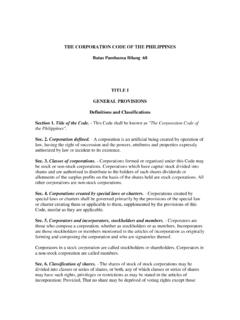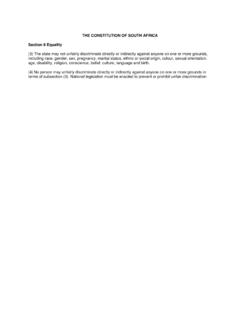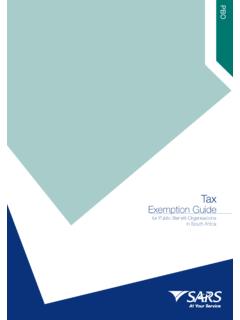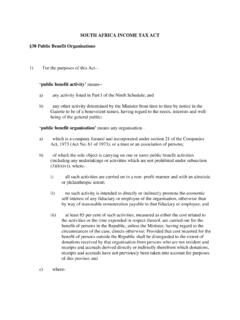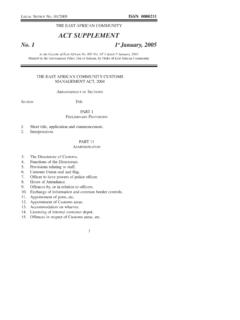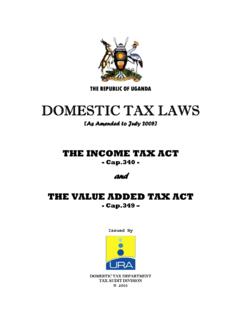Transcription of COUNTRY REPORT FOR NIGERIA - usig.org
1 COUNTRY REPORT FOR NIGERIA NGO LAWS AND REGULATIONS By Emeka Iheme INTRODUCTION A broad spectrum of NGOs exist in NIGERIA . Prominent are community-based organisations (CBOs) which exist in and draw membership from those who live in particular geographical areas or from among people who have a more or less common ancestry, religious organisations, friendly societies and a host of professionally-run NGOs working in different thematic areas. It may be argued, in strict jurisprudential terms, that some of the bigger, older and well-established Christian religious organisations, such as the Catholic and Anglican churches ought not to be described as NGOs because they are managed and their property held in the name of an office ( bishop) occupied by individuals which has perpetual succession. (The bishop is a corporation sole, a concept we have inherited as part of the common law.)
2 It is however accepted that these religious bodies being voluntarily, not-for-profit and outside of state control qualify to be described as NGOs. The legal framework for non-governmental organisations (NGOs) in NIGERIA is defined by provisions of the Constitution of the Federal Republic of NIGERIA 1999 as well as federal and state laws. Prominent among the federal enactments are Companies and Allied Matters Act 1990 (whose Part C has repealed and replaced the Lands (Perpetual Succession) Act 1924) and Companies Income Tax Act 1961. These are general enactments. Specific laws also exist to regulate specialised organisations such as trade unions, cooperative societies and political parties. Apart from the enforcing of laws that recognise and regulate these organisations, government departments in some instances require NGOs to register with them for the purpose of collaborating with or working for such departments in some programme areas.
3 Relatively, Nigerian NGOs are not subjected to an elaborate set of laws. The foundation laid in the colonial era was one that provided an NGO with formal state recognition, if it sought that, and allowed it great freedom of action provided it did nothing to threaten public order. The military rulers who began to emerge after independence did not trust the NGOs as much. Thus, while the colonial government worked in partnership with NGOs, especially the missionaries who, in addition to evangelism, established and ran health, educational and social welfare institutions, the military governments expropriated them of these establishments. Increased repression by the military governments led to the emergence in the late1980s of the human rights NGOs. Human rights NGOs became special targets for refusal of legal recognition and for close monitoring and harassment.
4 These were effected not necessarily through the enactment of new laws but simply through the arbitrary implementation of existing laws or through state-sponsored violence. Thus, a presentation of both the law and the official practice is required for a full understanding of the regulation of the NGO sector in NIGERIA . In the absence of adequate and well-intentioned laws, self-regulation is the alternative approach that presents itself to the NGO sector. Unfortunately, except for some very loose regulations or understandings introduced by some NGO networks and coalitions, no set of clear and far-reaching regulations or code of ethics has been introduced by the NGOs for themselves. A probable explanation for this is that the most virile and articulate part of the NGO sector, the human rights groups, had up to the restoration of constitutional governance in May 1999 largely operated underground and had to contend with much more compelling tasks.
5 Be that this may, it seems that the Nigerian NGO sector should no longer defer the developing of a set of rules to regulate itself. It is noteworthy, in this regard, that the Transition Monitoring Group, the largest NGO coalition in NIGERIA , is currently leading an initiative aimed at introducing, after wide consultation with other stakeholders (especially donors and the media), a Code of Standard Practice for NGOs. PROVISIONS OF THE GENERAL LAWS ConstitutionThe "right to peaceful assembly and association" is granted in section 40 of the Constitution of the Federal Republic of NIGERIA 1999 in the following terms: "Every person shall be entitled to assemble freely and associate with other persons, and in particular he may form or belong to any political party, trade union or any other association for the protection of his interests." This provision is, by the Constitution itself, limited in three remarkable ways.
6 First, by a proviso to section 40 itself, "this section shall not derogate from the powers conferred by this Constitution on the Independent National Electoral Commission with respect to political parties to which the Commission does not accord recognition." The prerogative of the electoral commission to give legal recognition to political parties and the restriction on formation of political parties are elaborated upon in section 222 of the Constitution as follows: "No association by whatever name called shall function as a political party, unless- a) the names and addresses of its national officers are registered with the Independent National Electoral Commission; b) the membership of the association is open to every citizen of NIGERIA irrespective of his place of origin, circumstance of his birth, sex, religion or ethnic grouping; c) a copy of its constitution is registered in the political office of the Independent National Electoral Commission in such form as may be prescribed by the Independent National Electoral Commission.
7 D) any alteration in its registered constitution is also registered in the principal office of the Independent National Electoral Commission within 30 days of the making of such alteration; e) the name of the association, its symbol or logo does not contain any ethnic or religious connotation or give the appearance that the activities of the association are confined to a part only of the geographical area of NIGERIA ; and f) the headquarters of the association is situated in the Federal Capital Territory, Abuja." In sections 221, 223, 224, 225, 226 and 227 further rules are prescribed for political parties. The effect is that the right to form political parties is heavily abridged by the Constitution and one of the issues on which there is a near-consensus in the on-going constitutional review process is the need to increase the level of citizens' participation in politics by liberalising the recognition of political parties.
8 The second limitation on the right to freedom of association is the provision in section 45 which permits restrictions on and derogation from certain fundamental rights (including freedom of association) by stating that nothing in the sections where those rights are spelt out "shall invalidate any law that is reasonably justifiable in a democratic society - a) in the interest of defence, public safety, public order, public morality or public health; or b) for the purpose of protecting the rights and freedom of other persons. In its 1985 decision, the Supreme Court of NIGERIA had occasion to demonstrate the effect of this restriction in the case of Osawe v. Registrar of Trade Unions (1985). In that case, the plaintiff applied to the Registrar of Trade Unions for the registration of a new union of non-academic staff of schools. The Registrar refused, stating that a union already exists for that category of workers, and relying on section 2(2) of the Trade Union Act 1978 which provides that "no trade union shall be registered to represent workers or employers in a place where there already exists a trade union.
9 " Relying on the provisions of the 1979 Constitution which are the same as the 1999 Constitution provisions under discussion, the Supreme Court held that while the provision of the Trade Unions Act infringed the right to freedom of association, it was nonetheless saved as a law reasonably justifiable in the interest of public order which, according to the court, will be jeopardised if the proliferation of trade unions is not discouraged. It is respectfully submitted that this decision is erroneous. In the light of the increased awareness of human rights in NIGERIA in the one and half decades since the decision was reached, it is doubtful if the Supreme Court will return the same verdict were the case to come before it today. The conclusion that public order is necessarily endangered without trade union monopoly is disproved by the history of the trade union movement in the United Kingdom where there is no trade union monopoly and from whose trade union movement that of NIGERIA has been patterned.
10 Trade union monopoly is an anachronistic practice which flourished in the socialist countries where it was used as a mechanism for ensuring convenient state control of the labour force. It has no place in an open society. Trade union monopoly is a direct infraction of freedom of association as freedom of association necessarily implies the freedom of dissociation. Further still, trade union monopoly is recognised by the International Labour Organisation (ILO) as a practise that is in breach of the ILO Convention No. 87 on Freedom of Association and Protection of the Rights to Organise; and as NIGERIA has adhered to this Convention, a regime of trade union monopoly is in breach of NIGERIA 's international law obligations. Generally, however, while it is not inconceivable that, even in peace time, it may be necessary to enact laws to contain or otherwise interfere with associations that threaten public safety or public order or public morality, the cause of liberty requires that we remember always that the security of tenure of an incumbent government is not synonymous with the need for public safety or public order, and that morality may be relative.


